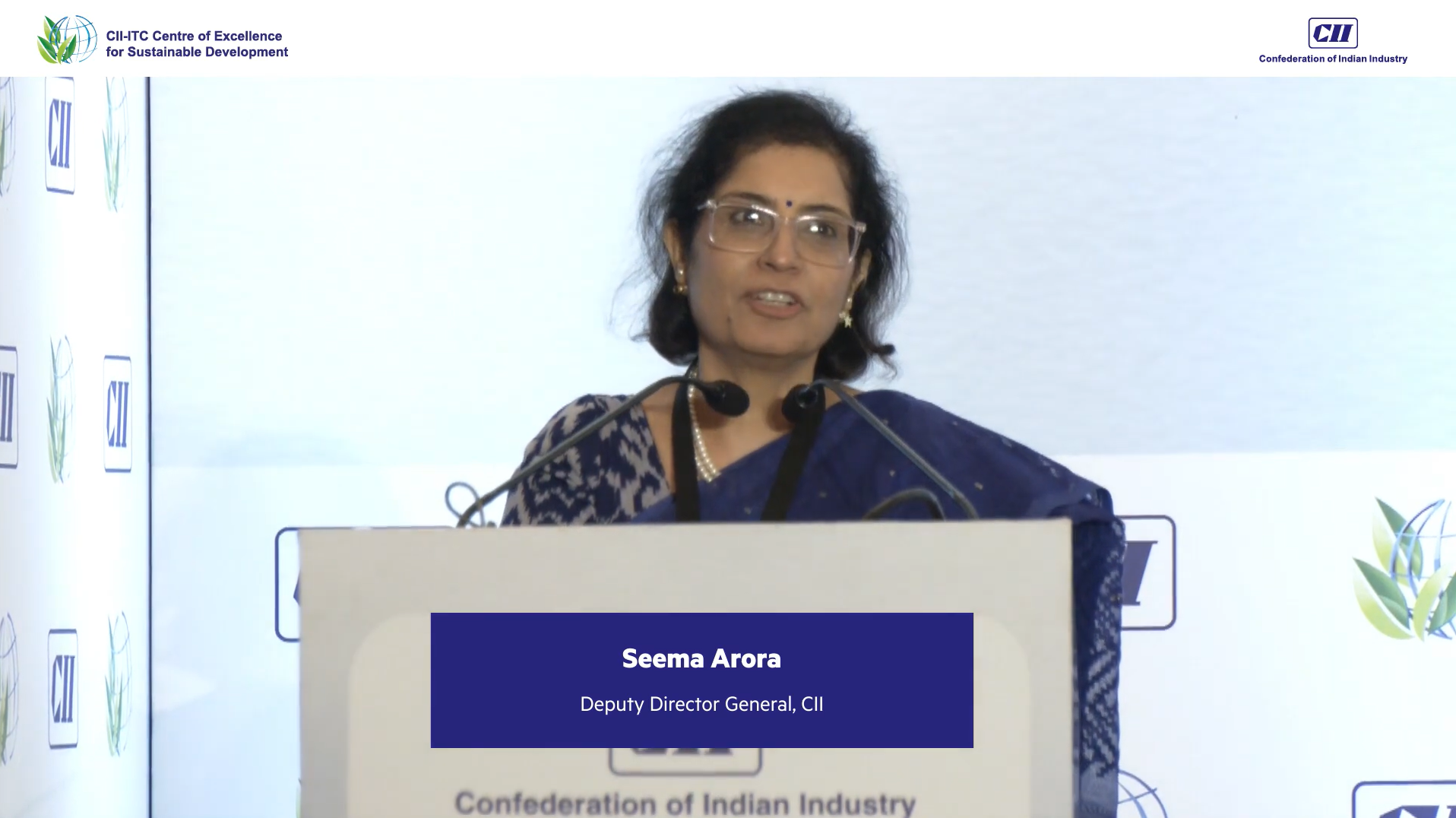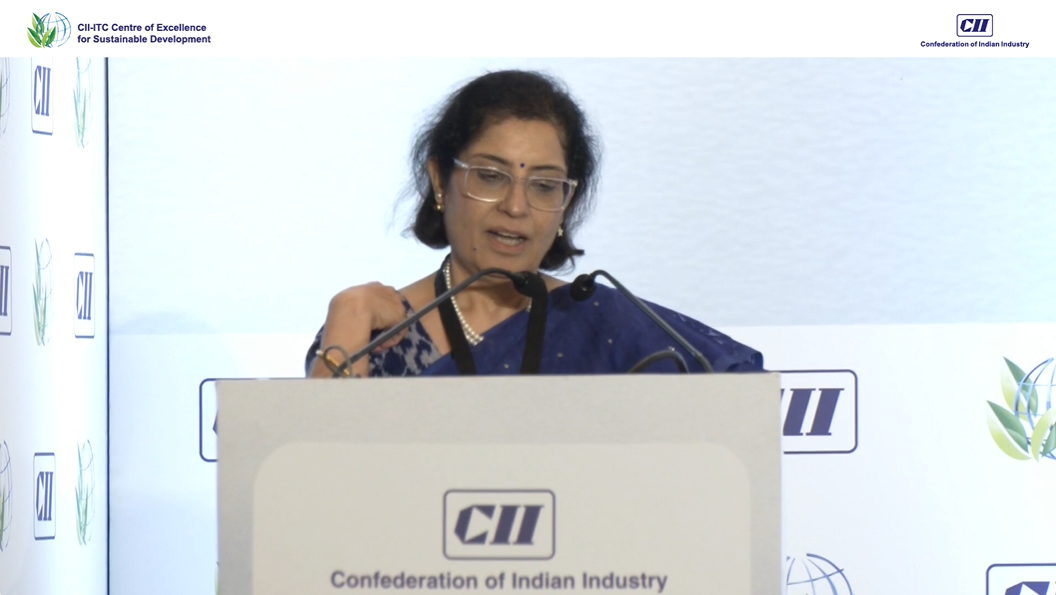Remarks by Seema Arora at the 19th Sustainability Summit

Ms Seema Arora
Deputy Director-General, Confederation of Indian Industry
The following is a transcript of remarks delivered by Seema Arora, Deputy Director General, CII, at the Velidictory Plenary: India’s Leadership in Driving a Sustainability Conscious World during the 19th CII Sustainability Summit in New Delhi on 18 September 2024
Good Afternoon Ladies and Gentlemen!
I know everybody has been having a very good two days, meeting new people, making newer connections and I'm sure learning new insights, so welcome once again to the final session of the CII 19th Sustainability Summit.
Let me begin by welcoming Mr Shombi Sharp. Thank you very much Mr Sharp for being with us for this important valedictory session which is the culmination of the CII Sustainability Summit - the 19th edition. As we had begun yesterday morning, I had mentioned that we have 14 panel sessions, two special plenaries which were high level sessions. Over the last two days we’ve had 450 people participating in the panel sessions and plenaries.
So, it has seen a lot of interest, a lot of dialogue, debate, deliberations. Before I request Mr Sharp to address us and I think it's very, very opportune that he's here with us because next week is the United Nations Assembly where there will be assessment of the SDGs and I know that UNDP has been playing a stellar role. I'm sure that some of the things that we discussed here today and yesterday (which I’ll try and summarize) would also resonate with him and what he would probably also wish to take back with him.
The theme of this year's summit is Driving Change for a Sustainability Conscious World and while there’s been multiple insights, one of the key insights that came through very clearly is that it's really important to drive a sustainability culture if we have to make sustainability a true movement in any sense and I think that resonated a lot because of the theme that we also had put in. It's not just cultures within an organization but also individually how do we culturally become more sustainable as an individual, as a community, as a society, as of course organizations, as nations and then of course hopefully the world also becomes more sustainable.
So, it is important to actually drive this culture of sustainability. We can have a lot of sustainability strategies but to ensure that these sustainability strategies are successful, the cultural aspect is very important and that's the key message. Sometimes I have seen that companies grow, they acquire a lot of other companies and that's very good because they acquire new skill sets but none of that translates into business because the culture doesn't marry between the two organizations and it's similar with sustainability. We can have beautiful sustainability strategies and low carbon but if we do not integrate it into every day, how will we operationalize it and that's what I call the culture. I don't think we can actually make that transition and that's the message that came out from the Summit. This is not a message that I'm bringing but the Summit is, and I think that is very important.
Aligned with this is the message that sustainability is a social goal and that was very interesting again and again it resonates with the SDGs, because sometimes we forget that all of this is interconnected, right? It's not just about efficiency, it's not just about circularity, it's also about climate justice, it's also about equity, it's also about inclusivity. So, I think this also came through that sustainability is a social goal and why it's a social goal because finally what do we want? We want each and every stakeholder to have access to a dignified lifestyle. This is because if we are talking from a sustainability point of view, we have to look at the common good and what is the common denominator? It is that everybody, every stakeholder has access to dignified lifestyle and while we can define the parameters, I'm not going there and therefore we need to look at it as a social goal. One of the ways to achieve this as an Industry and as individuals is the need to move from mindless consumption to mindful utilization and the Minister himself said this.
I think this is a very strong message. We need to consume because consumption drives growth. Businesses have to create products and services, people have to use those products and services, the economies have to grow, so nobody is saying don't consume but instead of mindless consumption, let's do mindful utilization and do this by creating circular business models, that are efficient and ensures what we want, that is to have sustainable economic and equitable growth. This is why again sustainability is a social goal because we will be doing all of this to ensure everybody has access to dignified lifestyle, so mindful utilization not mindless consumption was one of the messages.
There is one more thing that struck me and that I wanted to bring to everybody's attention. We all know that that different types of industry sectors have different needs, be it the service sector, manufacturing sector, SME's, large companies etc. Therefore all our initiatives, regulations, global policy interventions or global negotiations have to keep this principle in mind that one size does not fit all because sometimes we operate from that lens, that one size fits all. If I say that and believe that it will be done in a uniform manner across companies, across sectors, across geographies, that's not going to happen, and that's the reality.
So how do we make sure that from forums like this, through the work that we do every day, through the people we influence every day, we bring this principle to the attention of all the stakeholders who are in that position to influence policy dialogue, to influence the creation of new metrics of measurements. How do we bring this principle of materiality to the fore? It is essential to know that one size fits all will not help anybody and least of all companies who are trying to make the transition; it makes transition even more difficult if we assume that one size fits all because sometimes, we think that will be efficient, as everybody can do it but actually it's not efficient, rather it is counterproductive. If we go back and think, that's one thing that came out.
We have been talking a lot about value chain and we recognized the value chain partners who had done tremendous work and again I think we'll continue to do this, and we need to grow this multiple times. What came out very clearly was that this value chain work is anchored very strongly in partnership. It cannot work if the sourcing company doesn't look at the value chain partners while using the partnership and mentorship approach. It's not that thou shall do this, that will not work. It is how can I help you achieve it but rather, I’ll help you achieve this because I also want to achieve it and you are a partner for me and so I’ll help you do it. So, it has to be through that hand holding mentorship approach that we need to do this and again all the tools that we provide to do this including finance also has to come through using that approach.
So, these were some of the key thoughts and there were many suggestions around water, around nature positivity, around need for positive action, responsible action, inclusivity, but I think these were the key messages through all the sessions and tracks that I could pick up and my team also helped me.
As I was mentioning earlier to Mr. Sharp, during all this conversation, we have the thought leaders from Industry, from different sectors coming and talking and we focus not more on the problem but on the opportunity and how do we bring scale in terms of the solutions because pilots are good but we need to scale so that's what we've been focusing on as CII. During the Summit, we launched a lot of our tools and frameworks and initiatives and reports which we believe will help all of this action to accelerate and scale. So that's what we did - we brought the focus on adaptation, we had the report on building climate resilience for industry, we had a very detailed discussion, we came up with some takeaways on how we will take this forward and that's our agenda as CII with all of you going forward the next year.
Similarly, we launched the Eco Edge tool where we will now have many more value chain partners bring in their data, we create the common baseline, we take learnings and we scale it up many fold.
We also had a compendium launched on ‘CSR best practices using technology’ and they are being spotlighted for more action and of course we had these roundtables on Clean Air Pathways, on India Plastics Pact and circularities which will continue to take the ideas forward through our initiatives. Through these conversations, by bringing these publications, tools etc, CII makes sure that we enable all of you to do this at a faster pace and at scale.
By the way, all of this will also translate into insights that we take to different policy makers at different levels. So we had Additional Secretary from the Textile Ministry come in and we know from his address that basis the work that he saw being done with the automotive sector, they are keen to look at the textile sector, taking on Eco Edge at a much larger scale, in the clusters of the textile sector.
Similarly, the work that we did on adaptation, we will be going and feeding that into the national adaptation plan and many more things. So not only will we continue to work with all of you in Industry but it will also feed into policy. So, this was what I wanted to recap for Mr. Sharpe and also for all of you. There were many more insights but I cannot share all of them in these 5-7 minutes but the key messages and how CII will continue to take it forward through the Centre's activities and many more touch points of CII.
Thank you very much for your attention.
Video recording of the speech is available here.

Published on 19 October 2024
